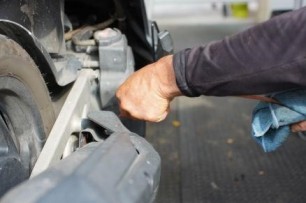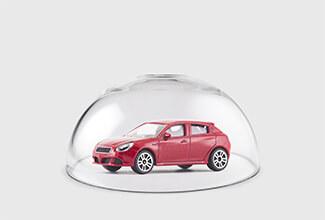General Insurance Blogs, Articles & Updates by - Magma HDI
Have us call you
- RENEW YOUR POLICY
- BUY NEW POLICY

Here are a few best ways to detect oil leakage in bikes
Motorcycles require more maintenance than anticipated to stay up and running. Over a period, your bike tends to undergo severe wear and tear. One way to keep it functioning is by regular maintenance.
Oil leakage is a strong indicator of your bike being internally damaged. Figuring out the point of the leakage can seem like a difficult task, but there are a few methods that you can keep in mind to ensure your bike is not susceptible to oil leakage. The leading cause of oil leakage is worn-out oil filters. Broken seals in the oil filters allow the oil to escape, thus causing leakage.
In this article, we will discuss a few ways you can detect if your bike is leaking oil.
1. Filter cup:
A filter cup that is worn out or has misaligned fibres can cause the oil to spill out. The misalignment in the filter cup can be caused by improper tightening of fixing screws. Check for leakage around the cup, and if it is leaking from the bottom, tighten the hose clamp.
2. Carburetor:
A carburetor is an essential part of the engine. It controls the flow of air and fuel and assists in combustion. The bowl that holds the carburetor can cause leakage if it gets old and is incapable of sealing the carburetor properly.
3. Checking fuel levels:
Another foolproof method of figuring out oil leaks is checking the fuel level of your bike with a dipstick. After the bike has cooled down, take note of the dipstick levels. If you notice a change in the levels over time, there is a loss of fuel.
4. Clean the areas:
The most susceptible areas to oil leaks are oil filters, oil pans, filter cups, valves, and hoses. Detecting an oil leak is convenient by inspecting these parts. If you observe changes in these areas, there is a chance of spillage or oil leakage.
5. Use a cloth or a paper:
Putting a dry cloth or a piece of paper under the bike is another smart way to check for oil leakages. Leave these under the bike overnight, and if you notice any spots or stains, your bike's fuel is leaking.
6. Smoke from exhaust:
Sometimes you can tell about oil leakage by checking the smoke from the exhaust. While riding the bike, if you feel that the smoke coming out from the exhaust smells like burning oil, it is probably an indicator of oil leakage.
These are a few ways to detect oil leakage from your bikes. Leakage is usually an indication of improper maintenance and extreme wear and tear of your bike. To combat these problems and increase your bike's longevity, you must ensure your motorcycle undergoes proper care and regular servicing.
Problems like oil leaks can cause severe internal damage to your bike if left untreated for too long. If you miss out on these simple steps, you may have to replace various bike parts, which can be expensive. It is advisable to invest in a comprehensive bike insurance plan to avoid these extra expenses. By buying bike insurance, you ensure that your bike gets complete financial protection against any costs that will follow if it gets damaged due to an accident.
Click HERE to know more about bike insurance.
Disclaimer: The information provided above is for illustrative purposes only. To get more details, please refer to policy wordings and prospectus before purchasing a policy.

Tips on how to keep your car insured while relocating
Packing up and moving out can be a real chore. Uprooting your life from a place you call home and trying to fit into a new environment is also quite emotionally draining. Sometimes we do it for love, sometimes for a better future. Whatever the reason, relocating is always a challenge. Among the million things that have you at your wit's end, managing car insurance in India generally takes a backseat. However, just as you would tend to any other asset, taking care of your car insurance needs will hold you in good stead. Here are some tips to consider before you hit the road!
Notify your insurer about the move
We live in a digitally connected world. All it takes is a couple of minutes for you to shoot an email, drop a text or even call the insurer’s helpline number and give the details of your new address. It also makes it easier for your insurer to communicate with you regarding things such as renewal, processing a claim and most importantly, providing the service you’ve paid for!
Re-register your car
If you are moving across state lines, you must get your vehicle re-registered with the Regional Transport Office (RTO) of your new domiciliary residence. However, prior to your relocation, remember to get a No Objection Certificate (NOC) from the RTO of your previous residence for a smooth transition. Once you get your new registration number, intimate your insurance company immediately so that the records are updated.
Re-evaluate your insurance needs
Depending on where you are moving, you may face a change in your insurance needs. If you’re moving to a metropolis like Delhi, brace yourself for never-ending traffic and possible nicks and bumps. In such a scenario, you may want to enhance your coverage. Similarly, if you are moving to a city like Mumbai, floods during monsoons are almost inevitable, where opting for add-on coverage like engine protection becomes a necessity. Consider all variables such as traffic, average drive time, safety, natural calamities, etc. and see if you need better coverage.
Implications of the move
Your relocation in all probability will affect the terms of endearment with your insurer. For example, ‘zonal risk’ is a variable insurance companies consider for premium calculations, and your move will have a direct impact on your annual premium. At the same time, the service quality may differ too. Do all the previous benefits carry over? Does your insurer have a strong presence at the new location? Do they have a robust network of garages? Get answers to all your questions before the move.
Look at your best interest
Insurance is all about your financial security and peace of mind. So if you have even the slightest doubt, don’t hesitate to look for another option. If you’re worried about losing out on your No Claim Bonus, fret not. You could easily carry over your NCB to an insurer like Magma HDI and continue to avail of all the benefits you previously enjoyed and more. A policy like Magma HDI's car insurance also provides safety against third party liability, damage, theft and natural calamities, making it a reliable choice wherever you go.

Let's understand the health benefits of cycling for elders
The end of the monsoon season is in sight, and even before we know it, we'll be ready for the winter days. The monsoon can be visually stunning, but it's not necessarily ideal for your bike. Post-monsoon brings a completely different downpour of problems for riders. This season demands a keen and prompt response to ensure your bike is in the best possible condition.
Now that the monsoon season is ending, you should give your bike its due attention. In light of the foregoing, we have compiled a post-monsoon maintenance checklist to get your bike road-ready. In that case, why delay any longer? Let's get this article rolling and prepare yourself for a thorough maintenance regime of your bike.
1. Tyres are important:
Don't let the air pressure in your tyres drop below the levels suggested by the bike's manufacturer. Inspect them for minor cuts that usually occur due to poor road conditions and potholes which might lead to more serious problems, such as a blowout. Make sure you inspect the tread depth of your tyres weekly. Make that the wheels are properly aligned and balanced.
2. Maintain battery:
If you want the bike's battery to last long with few problems, you should have it serviced right after the monsoon. Put some distilled water into the battery if needed. Look into the possible battery leakages. The bike must be in proper working condition and devoid of battery leaks. You should keep the motorcycle's battery fully charged if you haven't used it in a while.
3. Inspect the air filter and the exhaust:
Maintaining the air filter clean during the monsoon season is essential when airborne dust can quickly accumulate and clog the filter. Maintain regular air filter replacement schedules and increase cleaning frequency, especially during the monsoon days, since dust levels may grow in the winter. Check the exhaust for any residue or dirt accumulation due to flooding roads.
4. Don't forget to check the brakes:
Wet weather increases the likelihood that your bike's brakes will become more resistant to pushing, making riding in wet conditions dangerous. Therefore, it is essential to maintain an appropriate distance between the brake and the tyre.
Brakes that are either too stiff or too slack present a significant risk. If you experience screeching noise, it may be due to an oil shortage, or the front brake pads you’re your attention.
5. Remember the engine oil:
After the rainy season, keeping your bike's engine well-oiled is crucial for optimal performance and reliability. Before setting out on a long trip, ensure you monitor the oil level and keep it at the recommended level. Keep an eye out for any oil leaks that may have occurred because of the wet weather.
When carbon deposits are present, oil thickens, making it harder for engine parts to move. You should know that unclean oil will cause your motorcycle to use more gas and dramatically shorten the engine life.
This checklist of post-monsoon maintenance will be your go-to guide to having a fully operational bike ready to take you for your desired exploration.
Getting your bike serviced and having appropriate bike insurance will ensure your bike is maintained properly. Buying or renewing your bike insurance isn't as time-consuming or expensive as it was. Modern methods have made it possible to buy bike insurance online in minutes. Get yours now!
Click HERE to buy the best bike insurance online in India.
Disclaimer: The information provided above is for illustrative purposes only. To get more details, please refer to policy wordings and prospectus before purchasing a policy.

How can your insurance save you money
Let's face the fact, who doesn't like to save money? Though many people see insurance as an unnecessary expense, it can still save your money and provide you with the financial security you need.
Motor insurance or vehicle insurance is an insurance policy that safeguards you financially when your vehicle undergoes damage or costs other people or their property. It's easy to buy motor insurance online and even easier to avail benefits that come with it.
So, are you looking for ways to save money on your annual motor insurance premium? We have put together some suggestions to help you save extra with your motor insurance.
1. Tax Benefits that you shouldn't miss: Most people invest their money into insurance when they land a job, as insurance policies have always been a popular tool for saving on income tax. But can an individual claim tax exemption for the premium paid on motor insurance? There is a small catch. If only the vehicle is in business use, the person qualifies for tax exemption on the premium paid for their motor insurance. Well, there is an exception here too. A claim may be made for a vehicle used for business and personal purposes, but it is time-bound. Meaning, the rebate is available for the proportion of time for which the car is being used for business purposes. So, for example, if a vehicle runs for ten hours per day, eight for business, and the remaining two hours for personal purposes. Then the taxpayer is allowed to claim the benefits from the insurance policy for the eight hours of business use.
2. General insurance benefits: People often prefer to deposit their money in savings accounts and avoid having insurance and paying the premium. The common factor they consider, if an individual doesn't claim their insurance during the valid period, all the premium paid is a waste. But, people don't consider the possibility that the amount claimed during an accident can be much more than the premium paid. And, in such instances, buying a good insurance policy is an intelligent choice.
3. Why buy motor insurance online? By choosing the right policy online, you can save a decent amount on the overall coverage cost. And, with your no claims during the policy period, you are entitled to a No Claim Bonus (NCB) upon the policy renewal. Everything can be managed online with ease, and additionally, your annual premium works out to be significantly cheaper.
4. Follow the motor vehicle legal requirements: It is a legal requirement to have motor insurance when driving on Indian roads. If you don't, you are violating traffic laws. Thus, having motor insurance saves you from paying enormous penalties. Moreover, since third-party insurance is mandatory, motor insurance can benefit the survivors in case of death during the accident.
Basic motor insurance is a legal necessity, and good motor insurance is a personal necessity regarding safety, financial security, and mental peace. One must remember that buying insurance comes with many advantages, and there is no advisory involved. Therefore, have the right kind of due diligence and pick the best motor insurance for you to save money.


